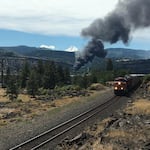
Train derailment fire as seen from Coyote Wall area on Washington state Route 14.
Courtesy of Derek Greenwood
An oil train bill was pulled from the Oregon House floor and returned to committee Friday over concerns about language that would make secret railroad spill contingency plans and financial responsibility documents.
The House voted 31-26 to return the bill to the Joint Committee On Ways and Means.
This effort to pass oil train legislation comes after a Union Pacific oil train derailed and caught fire in the Columbia River Gorge town of Mosier, Oregon.
The language in question was added during a long negotiating process involving railroads, who lobbied against the original version of a bill that would have given the state oversight of their response plans and assessed a fee on rail carriers to pay for additional spill planning.
Railroads argued those provisions violated federal law. Though other states have already adopted similar rules, lawmakers in Oregon removed them two years in a row. This year, legislators also added language that gave railroads an added layer of secrecy. Railroads have made several attempts over the past few years to keep information regarding oil train traffic from reaching the public.
Related: Oregon Oil Train Bill Moves To Floor, With Key Regulation Removed Again
Amendments to House Bill 2131 stated railroad contingency oil spill plans provided to DEQ would be exempt from public records requests and not disclosed to anyone outside of a few select government agencies. The change also stated that “no subpoena or judicial order may be issued compelling the disclosure of a contingency plan, except when relevant to a proceeding where compliance by an owner or operator of a high hazard train route with this section is to be adjudicated.”
Such exemptions from disclosure would have shielded oil train plans from public scrutiny. Trial lawyers also testified that the disclosure exemptions could keep crucial information hidden from anyone who might be injured and looking to sue in the event of a derailment.
Bill sponsor Rep. Barbara Smith Warner, D-Portland, said in a closing statement that the bill followed a long, complicated path of negotiation, and that she initially understood the language on confidentiality incorrectly.
“Once I understood its full impact I thought it was critical to make sure that we do the best possible policy here, and sometimes that may come at the cost of consensus. Because we are still doing incredibly important things for the state and the safety of our community," she told lawmakers.
In an interview after the vote, Smith Warner said she had been less concerned about public access to the information than she was making sure the state and first responders received it.
"I didn’t really see. I truly didn’t realize quite how far that went," she said of the amendments adding secrecy.
The Ways and Means Committee is expected to address the language and return the bill to the House sometime over the next few days, but Smith Warner said there is no guarantee the bill will make it back.
Related: Mosier Train Derailment, Oil Spill Anniversary Shows Progress And Problems
"This is a risk. This is a significant risk," she said. "I hope we can still get this. Because we’re now asking for something that the railroads don’t want to give us."
Others voiced concerns about returning a bill to committee that had consensus.
“This was a negotiated bill. Everybody was on board,” Rep. John E. Huffman, R-The Dalles, said. “Part of the reason the bill is the way it is right now, is so that it won’t be litigated ad nauseam like it is in Washington and other places. I encourage us to vote on the bill now. Let’s get this good bill moving.”
Washington previously adopted sweeping rules to improve its oversight of oil trains, assessing a fee on oil by rail shipments to pay for spill response planning and giving state regulators the power to approve or deny railroads’ spill contingency plans.
Those rules have not yet been challenged in Washington, according to a report from the Oregon Legislative Counsel.
In an emailed statement, Union Pacific spokesman Justin Jacobs said that out of 23 states it operates in, only California, Washington and Minnesota require detailed contingency plans, and that Minnesota agreed to redact information. He said the railroad is also awaiting a pending federal rulemaking on the topic.
“Union Pacific has the same goals as everyone else when it comes to safety," Jacobs said.
Related: Oregon Utility Board Approves Controversial Sale Of Oil Tanks
Huffman said he met with members of the Confederated Tribes of the Warm Springs, who he said were in favor of the bill and did not want it changed. Smith Warner, in closing statements on the bill, said she had also spoken with tribal nations on Friday, who she said were in “full support in this change in the language and bringing it back.”
Representatives of the Warm Springs tribe did not respond to calls for comment, but the tribe did lobby in favor of the original bill, which included public disclosure, regulatory oversight of oil train spill planning and fees on railroads to pay for the work.
Some advocates for the original bill, such as Michael Lang from Friends of the Columbia Gorge, still hope some enforcement component can be added in when it returns to the committee, but expect such a move would be unlikely.
